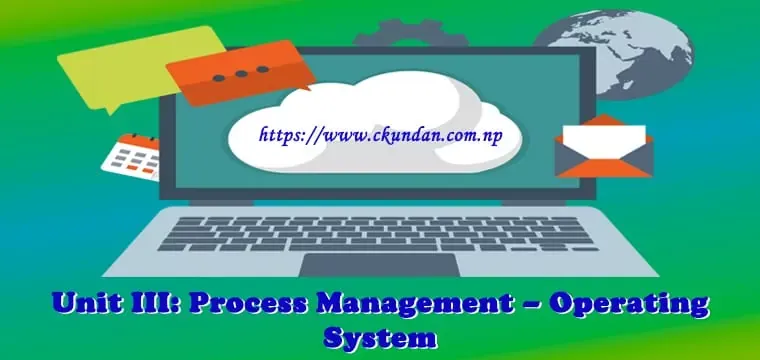A process is a program in execution. The process is not as same as program code but a lot more than it. A process is an 'active' entity as opposed to the program which is considered to be a 'passive' entity. Attributes held by the process include hardware state, memory, CPU, etc.
In this “ Process Management – Operating System” you will learn about the following topics:
- Process Concepts
- The Process Model
- Process States
- Process States Transitions
- Process Control Block (PCB)
- Operations on Process
- Process Creation, Process Termination, Process Hierarchies, Process Implementation
- Cooperating Process
- Advantages of Cooperating Processes
- System Call
- Types of System Call
- Process Management, File Management, Device Management, Information Management, Communication
- Threads
- Difference between Process and Thread
- Advantages of Thread
- Types of Thread
- User Level Threads, Kernel Level Threads
- Difference between User-Level & Kernel-Level Thread
- Multithreading Models
- Many to Many Model, Many to One Model, One to One Model
- Inter-Process Communication and Synchronization
- Race Condition
- (Rules for Avoiding Race Condition) Solution to Critical Section Problem
- Critical Region
- Methods for Avoiding Critical Region
- Mutual Exclusion Condition
- Proposals for Achieving Mutual Exclusion
- Disabling Interrupts, Lock Variables, Strict Alternation, Peterson's Solution, Test and Set Lock, Sleep and Weak up
- Producer-Consumer Problem
- Types of Mutual Exclusion
- Semaphore, Monitors, Mutex, Message Passing
- Serializability
- Lock-based Protocols
- Simplistic Lock Protocol, Pre-claiming Lock Protocol, Two-Phase Locking 2PL, Strict Two-Phase Locking
- Timestamp-based Protocols
- Thomas' Write Rule
- Classical IPC Problems
- Dining Philosophers Problems
- Readers Writer problems
- Sleeping Barber Problem
- Process Scheduling
- Types of Scheduling
- Preemptive Scheduling, Non-preemptive Scheduling, Batch Scheduling, Interactive Scheduling, Real-time Scheduling
- Scheduling Criteria or Performance Analysis
- Scheduling Algorithm
- Round Robin, First Come First Serve (FCFS), Shortest Job First (SJF), Shortest Remaining Time Next (SRTN), Priority Scheduling, Fair-share Scheduling, Shortest Process Next, Lottery Scheduling, Guaranteed Scheduling, Scheduling in Real-Time System, Multilevel Queuing, Multilevel Feedback Queue, Highest Response Ration Next (HRN)
==== Point to Note ====
If you like to contribute, you can mail us BCA Notes, BCA Question Collections, BCA Related Information, and Latest Technology Information at [email protected].
See your article appearing on BCA Notes (Pokhara University) main page with your designation and help other BCA Students to excel.
Please write comments if you find anything incorrect, or you want to share more information about the topic discussed above.
BCA 4th Semester Operating System Notes Pdf:
- Unit I: Introduction To Operating System
- Unit II: Operating System Structure
- Unit IV: Deadlock
- Unit V: Memory Management
- Unit VI: Input/Output Device Management
- Unit VII: File System Management
- Unit VIII: Security Management
- Unit IX: Distributed Operating System
- Unit X: Case Study Issues
- Unit XI: Future Issues




![BCA 1st Semester Question Papers Pdf [Updated]](https://blogger.googleusercontent.com/img/b/R29vZ2xl/AVvXsEgLAEigAxHSrlcaODdgkV0lKVobAcEHQq7xn1ca8t7uB7DBu5PQtNL2hkGYuHFDley4guAYwc8qUJ5gX79ejw9gT4SpnpeTd0lWIkF31OobOMaShc4_wi7rZTB00RGosV1d-HtKJ0QoClENdw1Xqe5B_ji8fuxwS5thSXCqAKLGBI-GvMCCCzsvtt-EaxA/w72-h72-p-k-no-nu/bca-1st-semester-old-question-pu.jpg)


0 Comments